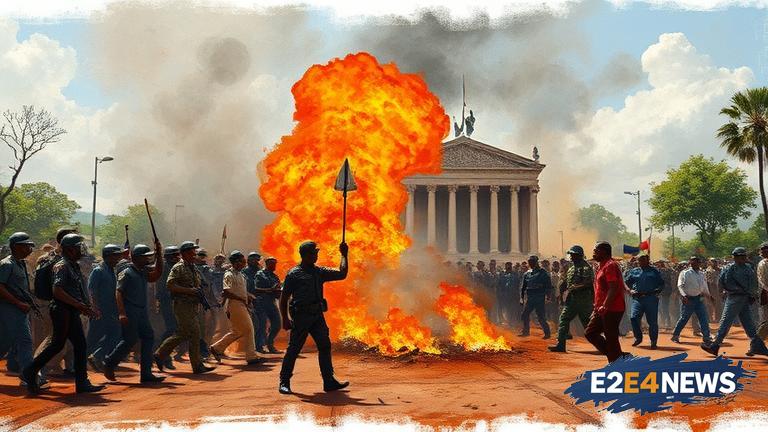The Zimbabwean government has been criticized for its heavy-handed approach to dealing with opposition parties, with many accusing it of attempting to stifle dissent and maintain its grip on power. In recent weeks, the government has launched a series of raids on opposition offices, arresting several high-profile figures and charging them with treason. The crackdown has sparked widespread condemnation, with many calling for the government to respect the rights of opposition parties and allow them to operate freely. The opposition Movement for Democratic Change (MDC) has been particularly targeted, with its leader, Nelson Chamisa, facing charges of inciting violence. The government has also been accused of using the police and military to intimidate and harass opposition supporters, with many reporting being beaten and arrested for attending rallies and protests. Despite the crackdown, the opposition remains defiant, with many vowing to continue their fight for democracy and human rights. The situation has been described as ‘volatile’ by observers, with many warning of the potential for further violence and unrest. The international community has also weighed in, with the United States and European Union calling for the government to respect the rights of opposition parties and allow them to operate freely. The government has denied any wrongdoing, claiming that it is simply maintaining law and order. However, many are skeptical of this claim, pointing to the government’s long history of suppressing dissent and opposition. The crackdown has also had a significant impact on the economy, with many businesses and investors expressing concern about the stability of the country. The Zimbabwean dollar has also plummeted in value, making it difficult for many to access basic necessities like food and medicine. The government has attempted to blame the opposition for the economic woes, but many see this as a diversionary tactic. As the situation continues to unfold, many are watching with bated breath, wondering what the future holds for Zimbabwe. The country has a long history of political unrest, and many fear that the current crackdown could be the spark that sets off a wider conflict. The opposition has called for calm, but it remains to be seen whether this will be enough to prevent further violence. The government has also been accused of using propaganda and disinformation to sway public opinion, with many state-controlled media outlets publishing false and misleading reports about the opposition. Despite this, the opposition remains committed to its cause, with many seeing the current crackdown as a sign that the government is becoming increasingly desperate. The international community has also pledged to continue supporting the opposition, with many calling for the government to be held accountable for its actions. As the situation continues to evolve, it remains to be seen what the future holds for Zimbabwe. One thing is certain, however: the current crackdown on opposition parties has significant implications for the country’s future, and the world will be watching with great interest to see how events unfold. The government’s actions have been widely condemned, and it remains to be seen whether it will be able to recover from the damage that has been done. The opposition, on the other hand, remains committed to its cause, and it is likely that the current crackdown will only serve to strengthen its resolve. The people of Zimbabwe deserve to have their voices heard, and it is imperative that the government respects their rights and allows them to participate freely in the democratic process. The current situation is a test of the government’s commitment to democracy, and it remains to be seen whether it will be able to pass. The world is watching, and it is imperative that the government takes steps to address the concerns of the opposition and the international community.





